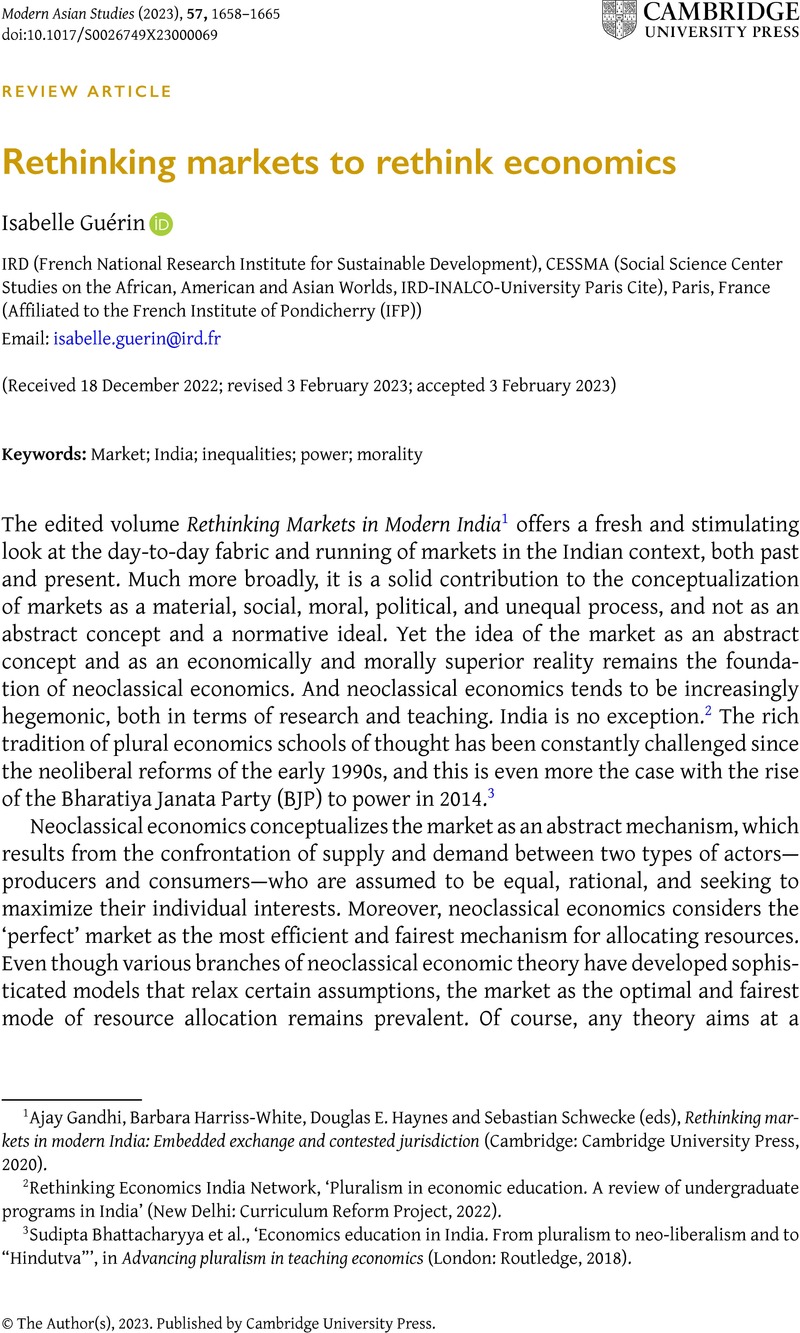No CrossRef data available.
Article contents
Rethinking markets to rethink economics
Published online by Cambridge University Press: 15 June 2023
Abstract

Keywords
- Type
- Review Article
- Information
- Modern Asian Studies , Volume 57 , Special Issue 5: Rethinking the Second World War in South Asia , September 2023 , pp. 1658 - 1665
- Copyright
- © The Author(s), 2023. Published by Cambridge University Press.
References
1 Gandhi, Ajay, Harriss-White, Barbara, Haynes, Douglas E. and Schwecke, Sebastian (eds), Rethinking markets in modern India: Embedded exchange and contested jurisdiction (Cambridge: Cambridge University Press, 2020).CrossRefGoogle Scholar
2 Rethinking Economics India Network, ‘Pluralism in economic education. A review of undergraduate programs in India’ (New Delhi: Curriculum Reform Project, 2022).Google Scholar
3 Bhattacharyya, Sudipta et al., ‘Economics education in India. From pluralism to neo-liberalism and to “Hindutva”’, in Advancing pluralism in teaching economics (London: Routledge, 2018).Google Scholar
4 Lazonick, William, Business organization and the myth of the market economy (Cambridge: Cambridge University Press, 1993)Google Scholar; Mazzucato, Mariana, The value of everything: Making and taking in the global economy (New York: Public Affairs, 2018).Google Scholar
5 Bloch, Maurice and Parry, Jonathan P. (eds), Money and the morality of exchange (Cambridge: Cambridge University Press, 1989)Google Scholar.
6 Michelutti, Lucia et al., Mafia Raj: The rule of bosses in South Asia (Stanford: Stanford University Press, 2018)Google Scholar; Harriss-White, Barbara and Michelutti, Lucia, The wild East: Criminal political economies in South Asia (London: UCL Press, 2019)CrossRefGoogle Scholar.
7 Guyer, Jane I., ‘Endowments and assets: The anthropology of wealth and the economics of intrahousehold allocation’, in Intrahousehold resource allocation in developing countries, (eds) Haddad, J., Hoddinott, J. and Alderman, H. (Baltimore: The Johns Hopkins University Press, 1997), pp. 112–129Google Scholar.
8 Ortiz, Horacio, ‘The limits of financial imagination: Free investors, efficient markets, and crisis’, American Anthropologist, vol. 116, no. 1 (2014), pp. 38–50.CrossRefGoogle Scholar
9 Jany-Catrice, Florence, A political economy of the measurement of inflation (Cham: Springer, 2020)CrossRefGoogle Scholar; Kapadia, Anush and Lemoine, Benjamin, ‘From debt dirigisme to debt markets in France and India’, in A world of public debts: A political history, (eds) Barreyre, Nicolas and Delalande, Nicolas. Palgrave Studies in the History of Finance (Cham: Springer International Publishing, 2020), pp. 373–403CrossRefGoogle Scholar, https://doi.org/10.1007/978-3-030-48794-2_15; Desrosières, Alain, The politics of large numbers: A history of statistical reasoning, (trans.) Camille Naish; 1st edn, 1993 (Cambridge, MA; London: Harvard University Press, 1998)Google Scholar.
10 Bayly, Christopher Alan, Rulers, townsmen and bazaars: North Indian society in the age of British expansion, 1770–1870, 1st edn, 1983 (New Delhi: Oxford University Press, 1998), p. .Google Scholar
11 Muldrew, Craig, The economy of obligation: The culture of credit and social relations in early modern England (New York: Palgrave Macmillan, 1998).CrossRefGoogle Scholar
12 Feher, Michel, Rated agency. Investee politics in a speculative age (New York: Zone Books, 2018).Google Scholar
13 Polanyi, Karl, The great transformation: The political and economic origins of our time, 1st edn, 1944 (Boston: Beacon Press, 2001).Google Scholar
14 Guérin, Isabelle, ‘Bonded labour, agrarian changes and capitalism: Emerging patterns in South India’, Journal of Agrarian Change, vol. 13, no. 3 (2013), pp. 405–423.CrossRefGoogle Scholar
15 Guyer, Jane I., Money matters: Instability, values, and social payments in the modern history of West African communities (Portsmouth; London: Heinemann/James Currey, 1995).Google Scholar
16 For the South Indian case, see Guérin, Isabelle, Govindan Venkatasubramanian and Santosh Kumar, ‘Rethinking saving: Indian ceremonial gifts as relational and reproductive saving’, Journal of Cultural Economy, vol. 13, no. 4 (2020), pp. 387–401CrossRefGoogle Scholar. For other parts of the Global South, see Peebles, Gustav, ‘Rehabilitating the hoard: The social dynamics of unbanking in Africa and beyond’, Africa, vol. 84, no. 4 (2014), pp. 595–613CrossRefGoogle Scholar; Parker MacDonald Shipton, Credit between cultures: Farmers, financiers, and misunderstanding in Africa (New Haven, CT: Yale University Press, 2010)Google Scholar.
17 Mosse, David, ‘The modernity of caste and the market economy’, Modern Asian Studies, vol. 54, no. 4 (2020), pp. 1225–1271.CrossRefGoogle Scholar
18 For labour, there is extensive empirical evidence. See, for example, Harriss-White, Barbara, India working: Essays on society and economy (Cambridge: Cambridge University Press, 2003)Google Scholar; Shah, Alpa et al., Ground down by growth. Tribe, caste, class, and inequality in twenty-first century India (London: Pluto Press, 2018)Google Scholar; Geert, De Neve, The everyday politics of labour: Working lives in India’s informal economy (New York: Berghahn Books, 2005)Google Scholar; Bolazzi, Floriane, ‘Caste, class and social mobility: A longitudinal study in a North Indian village, 1958–2015’, PhD thesis, Università degli Studi di Milano/University Paris Diderot, 2020Google Scholar. For a review, see Mosse, ‘The modernity of caste’. For debt, see, for instance, Guérin, Isabelle, Bert d’Espallier and Govindan Venkatasubramanian, ‘Debt in rural South India: Fragmentation, social regulation and discrimination’, The Journal of Development Studies, vol. 49, no. 9 (2013), pp. 1155–1171.CrossRefGoogle Scholar
19 Chandrasekhar, C. P. and Ghosh, Jayati, ‘The banking conundrum. Non-performing assets and neo-liberal reform’, Economic and Political Weekly, vol. 53, no. 13 (2018), pp. 129–137.Google Scholar
20 Michelutti et al., Mafia Raj.
21 Ibid., pp. 3–8.
22 Kar, Sohini, Financializing poverty: Labor and risk in Indian microfinance (Stanford: Stanford University Press, 2018).Google Scholar
23 Guérin, Isabelle et al., ‘Covid-19 and the unequalizing infrastructures of financial inclusion in Tamil Nadu’, Development and Change, vol. 52, no. 4 (2021), pp. 927–951.CrossRefGoogle ScholarPubMed
24 Harriss-White, India working.
25 Polanyi, The great transformation.
26 MacKenzie, Donald A., Fabian Muniesa and Lucia Siu, Do economists make markets? On the performativity of economics (Princeton: Princeton University Press, 2007).Google Scholar
27 Ingrid Harvold Kvangraven and Surbhi Kesar, ‘Standing in the way of rigor? Economics’ meeting with the decolonizing agenda’, No. 2110, Working Papers from the New School for Social Research, Department of Economics, 2021.





